Introduction
Work-related stress is an inevitable part of modern employment, but when this stress becomes chronic, it can have serious implications for mental health and behavior. One concerning outcome of prolonged workplace stress is the increased risk of substance use. This article delves into the complex relationship between stress at work and substance misuse, drawing from extensive research and expert insights.
Stress-Induced Addiction: A Pressing Concern
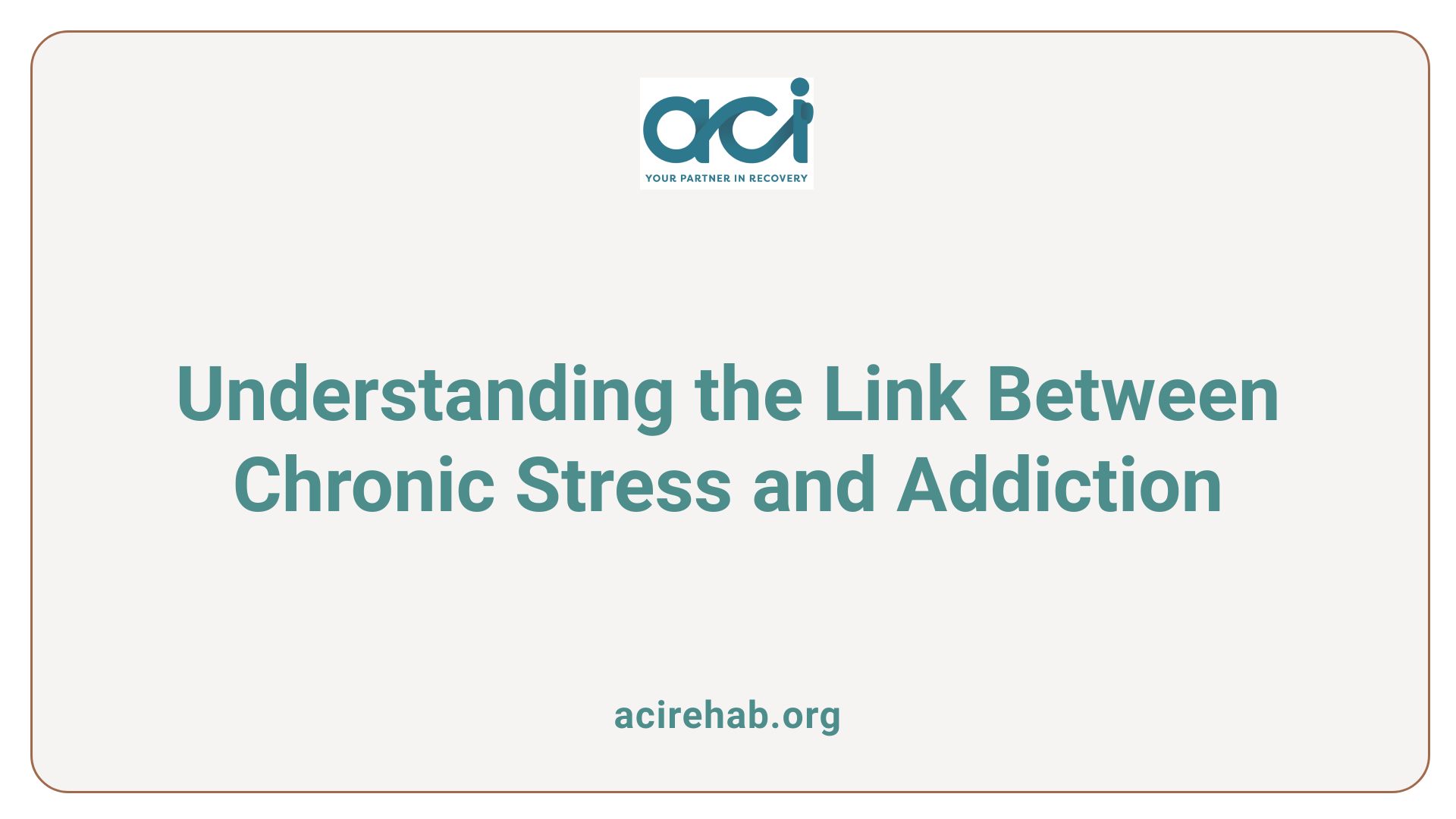
Chronic Stress and Addiction
Chronic stress arises from prolonged exposure to high-pressure work environments, where poor organization and overwhelming expectations can create significant psychological strain. This ongoing stress increases the likelihood of addiction as individuals may resort to self-medicating with alcohol and drugs in an attempt to escape their mounting distress.
Stress effectively alters brain function and coping mechanisms, making vulnerability to substance use more likely. As stress levels rise and healthy coping strategies fall short, escapist behaviors can emerge, leading to a cycle of dependency. The correlation between jobs in high-stress occupations, such as healthcare or emergency services, and substance abuse is particularly concerning.
Self-Medication Through Substances
Workplace stress often prompts individuals to seek relief in substances that provide temporary respite from emotional turbulence. Initially, substances might seem to alleviate symptoms of anxiety and depression. However, these coping strategies typically worsen pre-existing issues over time, fueling a dependency cycle.
For instance, a worker in a high-stress environment may consume alcohol during after-work functions to manage stress but inadvertently establish a habit that escalates into addiction. Furthermore, individuals lacking social or personal resources are more likely to turn to psychoactive substances, which only leads to greater health risks and strained personal relationships.
In conclusion, without effective support systems and healthy coping mechanisms, employees may find themselves increasingly reliant on drugs and alcohol, thus exacerbating their workplace stress and potentially diminishing their overall quality of life.
| Topic | Description | Example |
|---|---|---|
| Chronic Stress | Prolonged psychological strain | High-pressure jobs |
| Addiction | Dependence on substances | Alcohol or drug abuse |
| Self-Medication | Using substances to cope | Drinking after work |
Contributing Factors to Workplace Substance Abuse
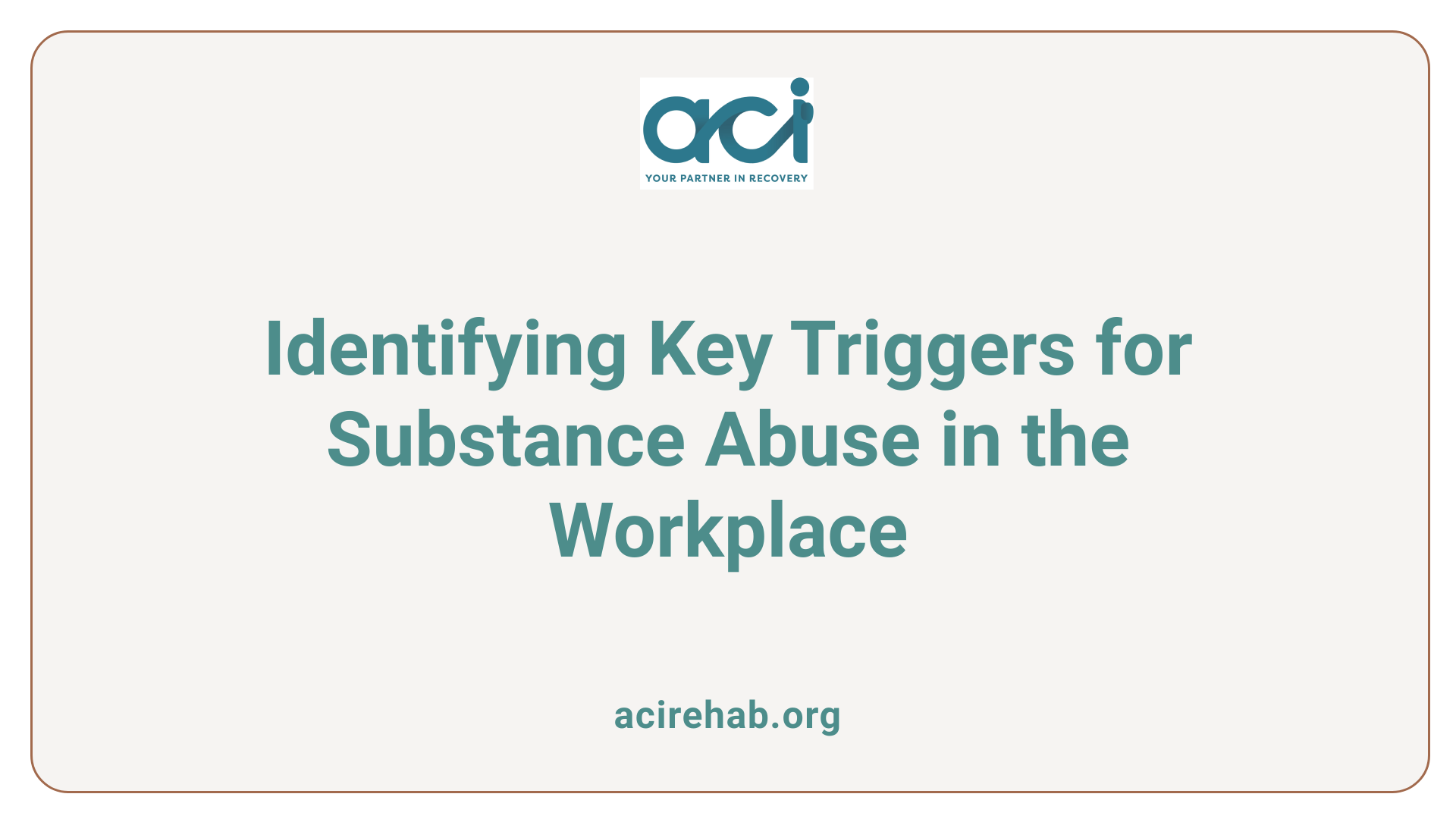
What are the factors contributing to substance abuse in the workplace?
Substance abuse in the workplace can stem from multiple contributing factors. The most significant is chronic stress, which often arises from a high-pressure environment characterized by job overload, unrealistic performance expectations, and insufficient support. These stressors can lead to feelings of isolation, anxiety, and even boredom due to a lack of engaging job challenges. As workers struggle to cope, they may resort to alcohol or drugs as a misguided means of self-medication, seeking temporary relief from their emotions.
Additionally, employees in specific industries such as nursing, hospitality, and law enforcement face unique pressures that further amplify their risk of substance use. For instance, professionals in healthcare often deal with emotional strain and burnout, heightening their vulnerability to alcohol and drug misuse. In high-stress occupations like firefighting and emergency response, substance use becomes an escape strategy from the intense demands associated with their roles.
Impact of Job Stress
The relationship between job stress and substance use is well-documented. Research indicates that persistent work-related stress not only leads to mental health issues like anxiety and depression but also increases the likelihood that employees will engage in substance use as a coping mechanism. Chronic stress can impair an individual’s ability to cope effectively with work demands, leading to a dangerous cycle where substance use exacerbates stress levels, compromising both psychological well-being and job performance.
Industry-specific Trends
Certain industries are particularly prone to higher rates of substance abuse due to their inherent stressors. A national survey indicated that accommodations, food services, and healthcare sectors show notable prevalence in substance use disorders. The cultural norms within these professions may even normalize unhealthy coping strategies, such as after-work drinking, which further perpetuates this issue. Ultimately, breaking the stigma surrounding addiction and fostering supportive workplace environments is essential to mitigate these risks, as workers often avoid seeking help due to fear of judgment.
Psychosocial Hazards of the Workplace
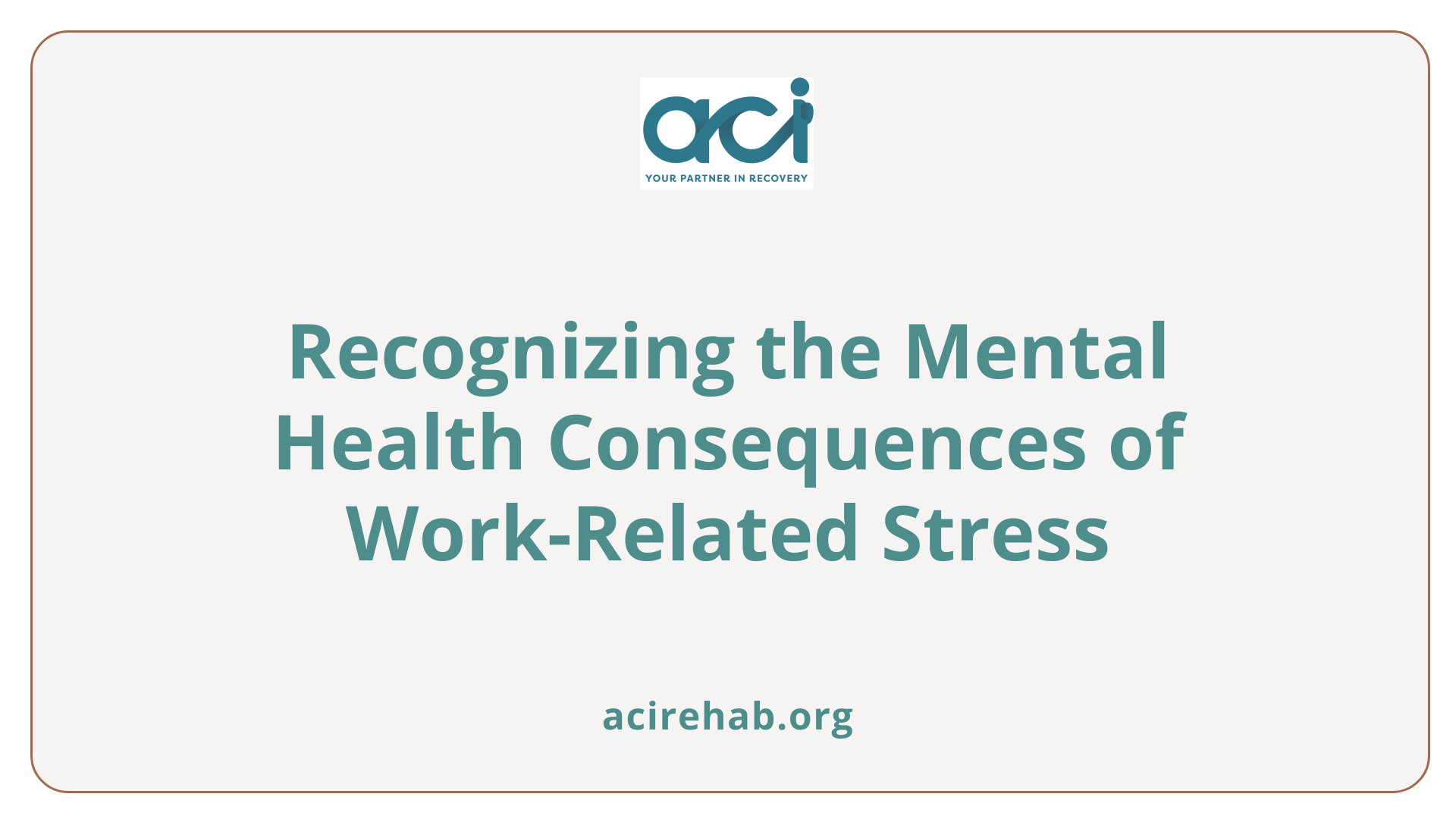
What are the consequences of work-related stress on mental health?
Work-related stress can significantly impact mental health, potentially leading to serious conditions such as anxiety, depression, and increased rates of post-traumatic stress disorder. The nature of psychosocial hazards—such as high job demands, low job control, and insufficient support—plays a critical role in this distress.
Job-related factors create an environment ripe for psychological strain. When combined with elements like workplace bullying, harassment, or poor interpersonal relationships, these hazards can exacerbate stress levels. This not only affects mental well-being but may also manifest as physical issues, notably musculoskeletal injuries.
Effective management is essential to mitigate these risks. Under model Work Health and Safety (WHS) laws, employers have a responsibility to evaluate and minimize psychosocial hazards to safeguard both the mental and physical health of workers. This includes understanding the types of pressures employees face and implementing supportive and preventative measures.
Psychosocial risks
It is imperative for employers to recognize that psychosocial risks contribute significantly to workplace stress. Factors such as excessive workloads, job insecurity, and lack of support systems not only heighten stress but can also lead to substance abuse as individuals seek coping mechanisms. This creates a feedback loop where stress and the impulse to self-medicate with drugs or alcohol perpetuate one another, deteriorating both professional performance and personal health.
Employer responsibilities
Employers bear the responsibility of fostering a supportive work environment. This can involve establishing Employee Assistance Programs (EAPs), promoting work-life balance, and developing clear policies that address and support mental health. Preventative measures like regular stress assessments and proactive employee support can help minimize the negative impacts of workplace stress.
In summary, the interplay between work-related stress and mental health underscores the need for vigilant management by employers to cultivate a healthier working atmosphere. By addressing these psychosocial hazards, they can help reduce incidents of both mental health issues and substance misuse among employees.
Anatomy of a High-Stress Job
Stress in Different Professions
Occupational stress varies significantly across professions. High-pressure roles such as healthcare workers, first responders, and corporate executives often encounter overwhelming demands. For instance, doctors and nurses deal with urgent patient needs, leading to burnout and increased vulnerability to substance abuse. Similarly, police officers and paramedics face emotionally taxing situations, making them more likely to resort to alcohol or drugs for relief.
Occupational Stress Impacts
The impacts of chronic stress in high-pressure jobs extend beyond the individual. Stressed workers may exhibit symptoms like irritability and difficulty concentrating, which impair job performance. Strain from work can lead to absenteeism and reduced productivity, with workers who log long hours displaying increased risky drinking behaviors. This creates a cycle where substance abuse exacerbates the original stress, further impacting mental health and job satisfaction.
Sector-Specific Substance Use
Different sectors exhibit varying rates of substance use. For example, healthcare, construction, and service industries have been identified with higher instances of alcohol and drug use. This is often linked to the demanding work environment and the culture that may normalize substance use as a coping strategy. In a national study, workers in settings like accommodations and food services reported higher rates of seeking substances to manage stress, emphasizing how job-specific demands interplay with substance abuse.
The Role of Coping Mechanisms
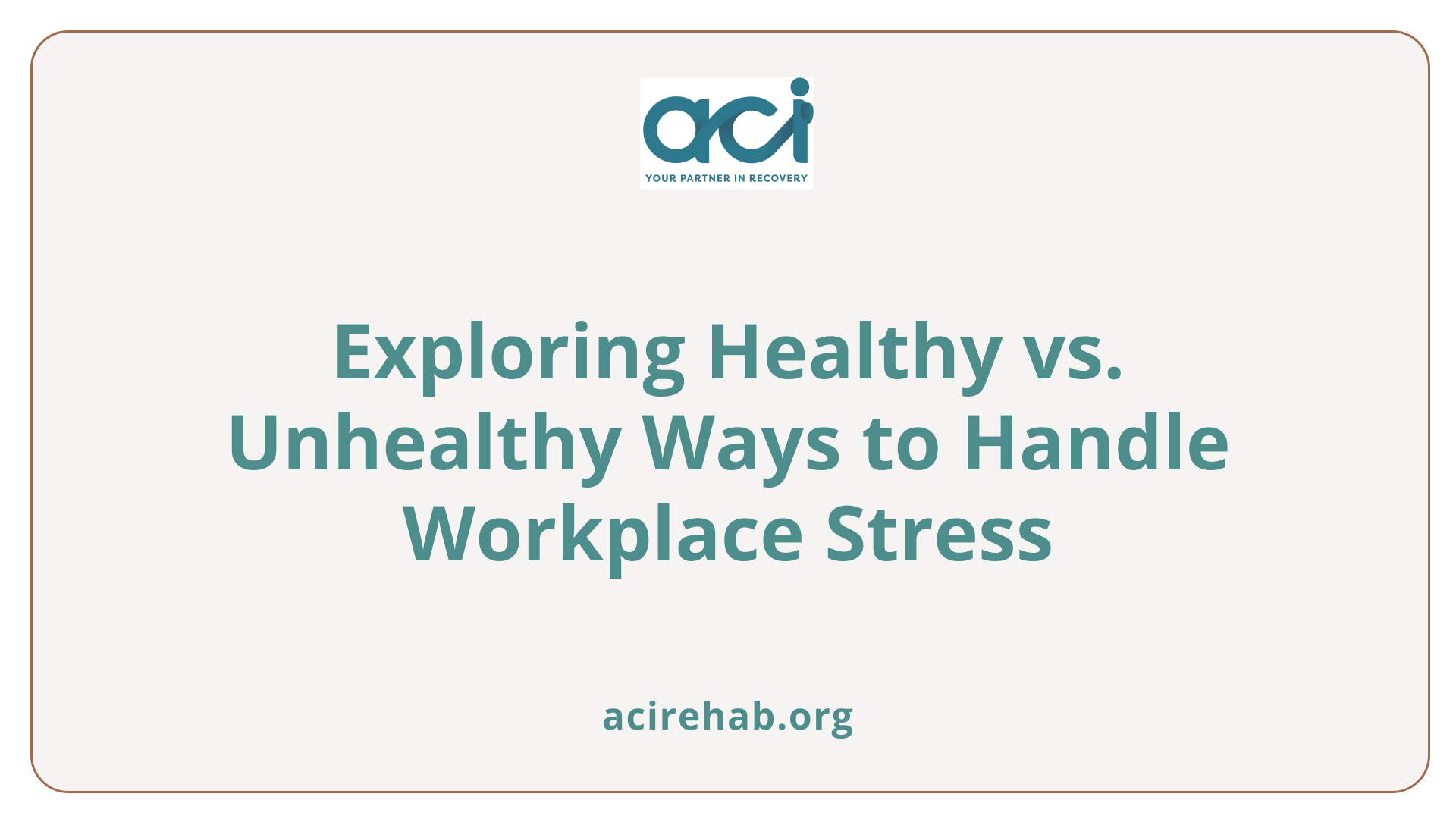
Healthy vs. Unhealthy Coping
Coping mechanisms play a crucial role in how individuals manage workplace stress. Healthy strategies include exercise, mindfulness practices, and social support, which can enhance resilience and improve mental health. In contrast, unhealthy coping techniques, such as drug or alcohol use, provide only temporary relief but can spiral into addiction and exacerbate stress, leading to a counterproductive cycle of dependence.
Strategies to Combat Stress
To effectively combat workplace stress, organizations can implement several supportive measures:
- Employee Assistance Programs (EAPs): Offer confidential support services for employees facing stress or mental health challenges.
- Promote Work-Life Balance: Encourage employees to maintain boundaries between work and personal life.
- Stress Management Workshops: Facilitate training on healthy coping strategies, like relaxation techniques and time management skills.
These approaches help create a healthier work environment, reducing the likelihood of substance abuse as a coping method.
Prevention and Support: Tools for Change
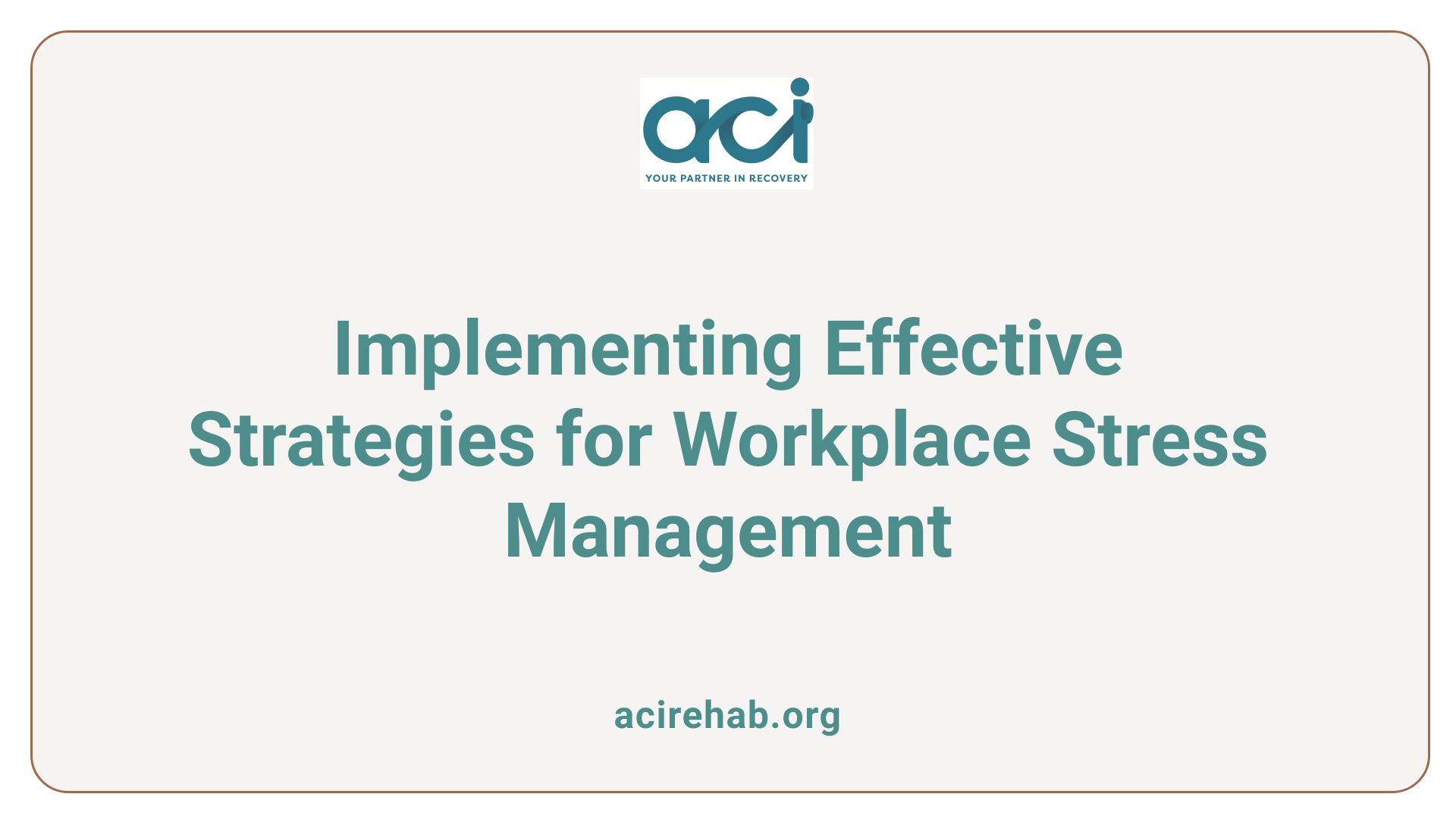
What are some preventative strategies and support resources for dealing with work-related stress and addiction?
Preventative strategies for addressing work-related stress and addiction are crucial for fostering a healthier workplace. One effective approach is the implementation of Employee Assistance Programs (EAPs). These programs provide confidential support and counseling for employees facing personal or work-related challenges, including stress and substance misuse.
Moreover, employers should prioritize ongoing substance misuse education to raise awareness about the consequences of stress and addiction. Promoting stress management resources—like workshops on mindfulness, time management, and resilience—can empower employees to cope in healthier ways.
Creating an environment of open communication between supervisors and employees is essential. This can encourage self-referrals for treatment, reducing stigma and fostering a culture of empathy where employees feel safe discussing their struggles.
How can workplace conditions be adjusted to alleviate stressors?
Adjustments to work conditions also play a critical role in mitigating stress. Employers can evaluate workload and reduce excessive demands that lead to burnout. Providing adequate paid time off is vital for allowing employees time to recharge. Additionally, promoting mental health resources and community-based support can further enhance employee well-being and decrease the likelihood of substance abuse.
These strategies collectively create a supportive framework that can help employees navigate stressors effectively and reduce the risk of addiction.
Consequences of Workplace Substance Abuse
Impact on Workplace Dynamics
Substance abuse can significantly disrupt workplace dynamics. Employees struggling with addiction not only face personal challenges, but they also impact team morale and cohesion. Their behaviors may lead to:
- Decreased productivity: Substance misuse often results in impaired performance, causing workers to fall behind on tasks and responsibilities.
- Increased absenteeism: Substance-related issues can lead to higher rates of absenteeism, increasing the burden on fellow team members and disrupting workflows.
- Safety risks: Employees under the influence can pose safety hazards, particularly in high-stakes environments like construction or healthcare, leading to accidents and injuries.
- Strained relationships: Personal issues can spill over into professional relationships, increasing tensions among coworkers and leading to conflicts in the workplace.
Economic and Health Costs
The economic implications of workplace substance abuse are profound. Organizations may bear the burden of:
- Healthcare costs: Increased need for medical treatment, rehabilitation services, and mental health support escalates overall healthcare expenses.
- Turnover and recruitment: High turnover rates due to substance abuse can lead to increased recruitment and training costs.
- Lost productivity: As employees deal with addiction, their ability to perform effectively diminishes, impacting the organization’s bottom line.
- Legal liabilities: Employers may face legal complications stemming from employee substance abuse, including violations of labor laws or workplace safety standards.
In summary, addressing substance abuse in the workplace is crucial for maintaining a healthy, productive work environment.
Understanding the Cycle: Stress and Substance Use
Cycle of Stress and Addiction
Chronic stress often leads individuals to cope through maladaptive mechanisms, including substance use. The high demands of certain jobs create pressure, leading many to self-medicate with alcohol or drugs. This cycle begins with workplace stressors, such as job overload and performance expectations, which can trigger substance use as a temporary relief. However, this strategy becomes counterproductive. Increased consumption leads to dependence and deeper emotional distress, making the original stressors even harder to manage.
Relapse and Recovery Triggers
Relapse is frequently tied to stress. When individuals experiencing addiction recovery encounter stressful situations—be it from demanding work hours or lack of job security—they may revert to drug or alcohol use as a coping strategy. Such scenarios highlight the need for effective stress management interventions. Recognizing the dual role that workplace stress plays in addiction can significantly aid in recovery efforts, emphasizing the importance of support systems within high-stress occupations.
Legal and Organizational Imperatives
Legal Protections for Employees
Legal frameworks exist to protect employees struggling with substance abuse and addiction in the workplace. Laws such as the Americans with Disabilities Act (ADA) provide protections against discrimination for individuals in recovery. Employees may be entitled to reasonable accommodations while undergoing treatment or rehabilitation, steering clear of punitive actions solely based on their addiction status.
Organizational Responsibility
Organizations play a crucial role in addressing workplace stressors that contribute to substance abuse. Employers should implement comprehensive Employee Assistance Programs (EAPs) to provide support for employees facing stress or addiction. Such programs can offer counseling services, stress management workshops, and strategies for healthy coping.
Industry-Specific Initiatives
Different industries may require tailored approaches, as stress and substance use can significantly vary across sectors. To foster a healthier environment, companies can create a culture of openness, encouraging employees to seek help without fear of judgment or repercussions.
The Broader Impact: Society and Culture
Cultural norms and substance use
Cultural environments can heavily influence how substances are perceived and used in the workplace. In many industries, particularly those with high-stress levels like entertainment, healthcare, and law enforcement, drinking or drug use can often be normalized as a method of coping with job pressures. For instance, after-work gatherings may encourage excessive drinking, fostering an atmosphere where substance use is not only accepted but expected.
Societal perceptions of workplace stress
The societal view of workplace stress has evolved, with increasing recognition of its detrimental effects on mental health and substance abuse. Many now acknowledge work-related anxiety as a significant public health challenge. This shift has pressured organizations to adopt better practices and support systems for employees, aiming to alleviate stress and its consequential substance use. Improved awareness and the fighting stigma surrounding mental health and substance use are vital in promoting healthier coping mechanisms within professional environments.
Conclusion
Addressing work-related stress and its link to substance use is crucial for maintaining both individual and organizational health. By understanding the factors contributing to workplace stress and addiction, and implementing effective coping and support strategies, employers can create a more supportive environment. Prevention efforts and cultural change at both societal and organizational levels are essential to mitigate the negative impacts of stress-induced substance use. Through collective action, we can foster healthier workplaces that prioritize mental well-being and reduce the risk of substance misuse.
References
- Job-Related Stress and Addiction | Free by the Sea | Washington State
- Is It Workplace Stress a Trigger for Alcohol and Drug Abuse?
- Are work stressors related to employee substance use … – PubMed
- Work-Related Stress and Addiction – The Phoenix Recovery Center
- Connection Between Work Stress and Substance Abuse – The Dunes
- The Effects of Substance Abuse in the Workplace
- Mental Health, Alcohol Use, and Substance Use Resources for …
- Chronic Stress, Drug Use, and Vulnerability to Addiction – PMC
- Work Stress And Substance Abuse – Northstar Behavioral Health

